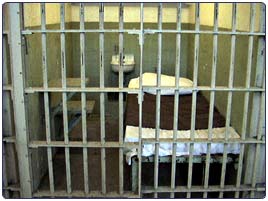The Cause of Crime
By Krishna Dharma Dasa | Sep 25, 2007

There are 80,000 people incarcerated in Britain’s prisons, twice as many as there were ten years ago – and the number is still rising. Strangely, though, crime figures are supposedly falling. That’s a debatable point, because many will argue that people are increasingly disinclined to report petty crimes, seeing that hard-pressed police are unlikely to respond, and even if they do it will serve little purpose. The chance of getting back stolen goods or having an offender apprehended in minor cases is remote.
Nevertheless, those offenders who do find themselves before a judge are more likely than ever to receive a custodial sentence. This at least is the view of the Prisons Reform Trust, which says that although the number of guilty findings in courts has stayed more or less the same, there has been a “creeping inflation of sentences and a lack of confidence in effective community measures.”
The trust puts it down to a number of factors, such as public demand for stiff sentences in the wake of high-profile, reviled crimes like child murders. However, it derives particularly from the prevailing political view that “prison works,” a phrase coined by Michael Howard when he was Home Secretary about fifteen years ago. Soon after that New Labour came into power with its manifesto to be “tough on crime, tough on the causes of crime,” a policy pursued till today.
But does prison work? Is it tough on crime and its causes? Figures show that 60% of prisoners re-offend within two years of release. Prison, of course, is an excellent place to meet criminals and learn new tricks. The Vedas point out how our consciousness is quickly shaped by our association, which in prisons is hardly of the best kind. With this in mind, another Home Secretary, David Waddington, said in a government paper, “Prison is an expensive way of making bad people worse.”
In fairness it has to be said that attempts are made to rehabilitate criminals, but seemingly to an insufficient degree.
So is more training the solution? According to the Vedas the answer is yes, but it has to be of a certain kind, and preferably before we find ourselves detained at Her Majesty’s pleasure. Srila Prabhupada writes, “Simply enforcing laws and ordinances cannot make the citizens obedient and lawful. That is impossible. Throughout the entire world there are so many states, legislative assemblies, and parliaments, but still the citizens are rogues and thieves. Good citizenship, therefore, cannot be enforced; the citizens must be trained.”
He goes on to say that the training must be in varnashrama, the Vedic system of organizing society into occupational and spiritual orders. This should have the aim of reviving our eternal Krishna consciousness, which is the purpose of varnashrama.
In such a properly educated and organized society crime would be reduced for different reasons. Initially, it would reduce the number of untrained, unemployed and possibly needy people who feel forced to resort to crime. But the main benefit, and one that tends to be absent from current government programs, is spiritual. Vedic training in spirituality or God consciousness makes one peaceful. It reduces the root cause of all moral transgressions: material desire. Because we think that having more means being happier, we will generally stop at little to get more, including breaking a law or two if we can go undetected.
Implementing varnashrama and engaging everyone according to their propensities, which it entails, is a major challenge, but its essential aim of awakening our Krishna consciousness is something we can do immediately. In a conversation with the Mayor of Evanston, a district of Chicago which was experiencing a crime wave, Srila Prabhupada asked that ISKCON be given facility for public chanting and dancing in glorification of the Lord and the distribution of sanctified food. He explained that this was the way to cure people of the “material infection” that leads to crime. Prabhupada said, “So if we cure that infection, again he becomes good. So this is the curing process. It is not an external, artificial thing, imposed upon somebody. No, his goodness is there.”
In other words, we are all intrinsically good, being parts of the supreme good or God. We just need to revive our original spiritual nature and that goodness will emerge. Being cured of the material infection also means finding within our selves the happiness we futilely seek elsewhere. Beguiled by an endless array of advertisements prompting us to purchase products we don’t need and can hardly afford, we are gripped with desire and then frustration and dismay when we either fail to procure them, or they fail to satisfy us even if procured. Hence we see spiraling statistics of depression, as well as a concomitant surge in the use of alcohol and drugs, major contributors to crime.
The only way to reverse this trend is to connect ourselves with Krishna, the source of spiritual bliss. Then peace and contentment will prevail. Otherwise our programs of social reform, devoid as they are of spiritual content, are always going to struggle.















